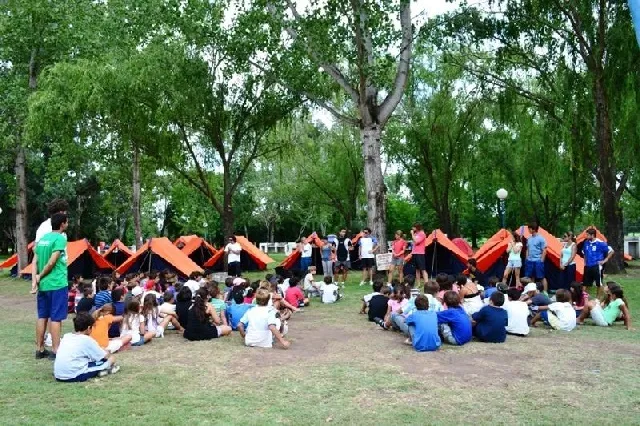Some 50 children and adolescents with type 1 diabetes of the entire province will participate in the annual recreational and educational camp that will take place in La Paz, on November 18 and 19, organized by the Endocrinology, Diabetes and Nutrition Service of the Maternal Child HospitalSan Roque de Paraná.
The Endocrinology, Diabetes and Nutrition Service of the San Roque Maternal Hospital, is the center of derivation of endocrinological pathology throughout the province, where children are treated with type 1 diabetes from birth and up to 15 years.
The head of the service, Ángela Figueroa overro, explained that diabetic boys from 9 to 15 years can participate in two camping days, where they know other boys and share the same activities regarding the control of blood glucose and insulin injection.The specialist said that "in the diabetic boys the carbohydrate counting is very important: knowing how much they eat and depending on that how much insulin they put on, and in the camp we work all those issues in recreational workshops to reaffirm knowledge in diabetological education".
It is sought that the camps have an educational impact on the boys, that they are not a mere encounter but that diabetological knowledge is affirmed."We do individual education and group education because the workshops are more fun when walking, playing, leaving the hospital," said Figueroa overro.
Between 40 and 50 boys participate in the camp, from the entire province.They are divided into "patrols" of ten and in each one is designated a leader in charge that is the example of control.Patrols are made up of a leader, a nurse and a doctor.
The approach is produced based on the development of workshops and recreational activities: during the two days the boys go to the pool, play the ball or the delegate accompanied by the interdisciplinary team and the encounter with the health personnel from another space thatfacilitates educational impact.
Both days begin with a group breakfast, self -control and insulin administration.The self -control and application of insulin are taught to be carried out (the boys get blood, glycemia are measured and in function they are injected insulin).In addition to insulin injections, for diabetic boys it is essential to develop some physical activity every day, in order to achieve stable weight;And they must also respect an adequate diet that controls the amounts of carbohydrates, fat and proteins that are ingested.
The disease and its treatment
Diabetes type 1 insulin -dependent mellitus is a chronic disease of the pancreas that causes the destruction of insulin producing cells;As a consequence, glucose accumulates in the blood.It may appear at any age, but it usually begins in childhood and adolescence and requires that children and adolescents are injected insulin to avoid the complications caused by the lack of this hormone.
The disease can generate acute and chronic complications.
Among acute complications, hyperglycemia (a very high level) can lead to a very serious picture, which can compromise the patient's life if he does not receive insulin in the first hours.For its part, presenting hypoglycemia (a very low level) the boy can convulse.
But also a bad control can generate chronic complications, for example if a boy is permanently with high glycems, what is called Diabetic Retinopathy, (alteration in view) can be produced;Diabetic nephropathy, (alteration in the kidneys);o Neuropathy, where there are different complications at the level of nerve terminals due to bad metabolic control.
"NoHe educates from fear, threats or complications, but seeks to educate trying to give boys that they can make a healthy life just like any of their peers if they maintain adequate control and healthy habits, "said Figueroa over.
The initial approach to diabetes with the boys is done with a working group, in which the nutritionist, the psychologist, the nurse and the doctor are involved.
the family: a fundamental pillar
The approach also seeks to contemplate and compromise the family: especially grandparents, uncles and those who remain in charge of the care of the boy."Food is also a therapeutic tool, we have to see it as such," said Figueroa over.
In addition, from the endocrinology, diabetes and nutrition service emphasizes physical activity."We always tell the parents that this time is an investment, because then the boy when he wants to have fun will go to play ball or basketthat when he did sports he enjoyed it, "said the specialist.
If the boy from 5 to 15 years old, or up to 12 yearsThey select it to play, and sport is fundamental for these guys."There they have to be the parents, accompanying, encouraging them, so we tell them that it is important to make a space to train that boy."
Interdisciplinary approach
The multidisciplinary service team is made up of doctors Ángela Figueroa Overro, Ana Laura García, Silvia Panzitta, Claudia Motta and the collaboration of Gerardo Traverso, a pediatrician who comes from Galarza every year;Physical Education teachers Alejandra Pérez and Santiago Sampieri;In Nursing Susana Waigandt, Ángel BertoCHello, Iván Retamal and Claudia Sánchez;Nutritionists Luisina Iturria, Agustina Devinar, Gianella Pison, Evelin Barabs, Matías Ducrano, Antonella Tiego and Laura Larrateguy;The psychologists Natalia Orzuza and Natalia Nerone.In addition to the educators (who will be in charge of patrols in the camp) Ariana Cabrera, Susana Unrein, Sofía Wolf and Sol Leiss.
From the organization they indicated that the activity could not be carried out without the valuable collaboration of the Cooperator of the Maternal Children's Hospital San Roque;the support of the hospital management;the support of the Ministry of Health, which declared the camp of ministerial interest;and the Costa Dorada hotel in La Paz and the transport company, Antarctica Argentina.


